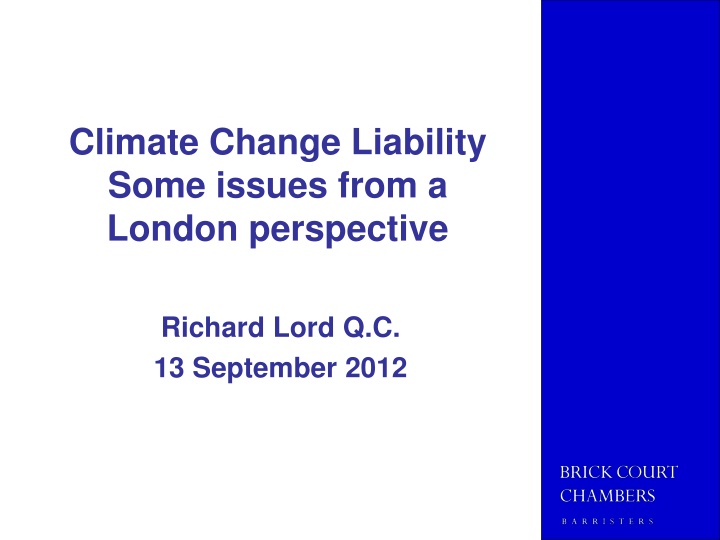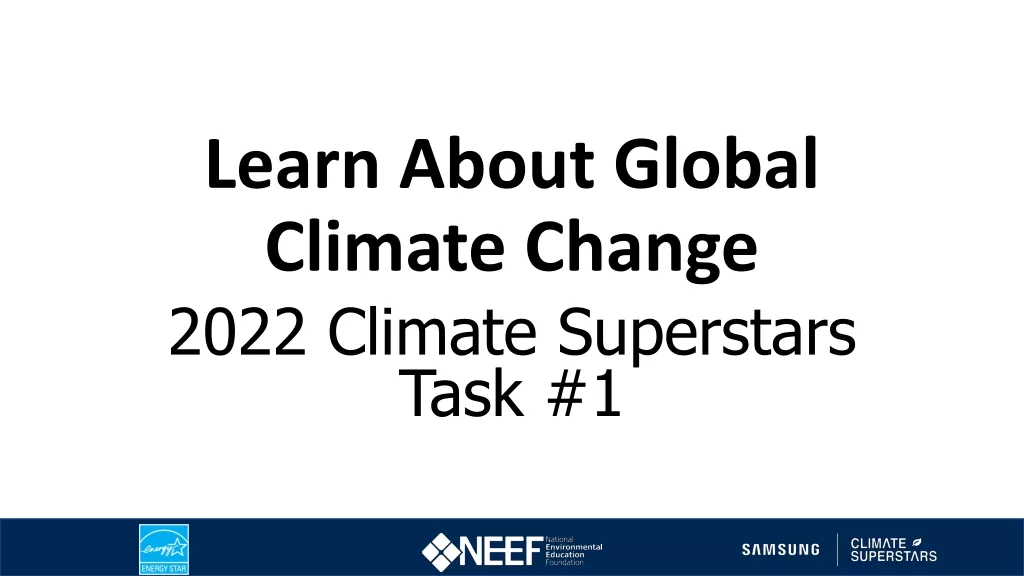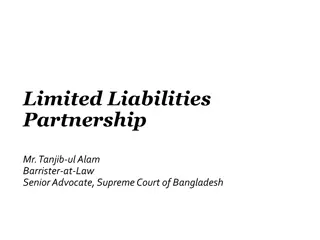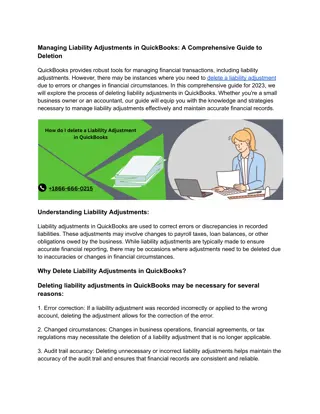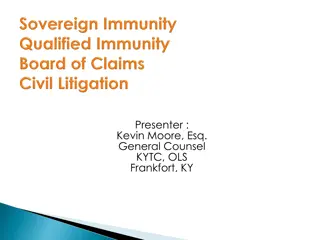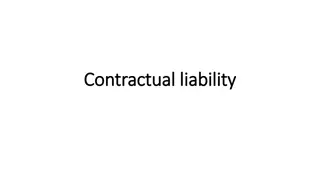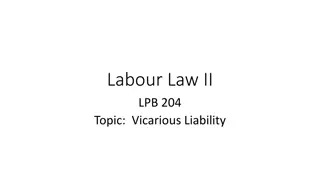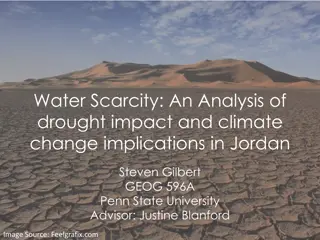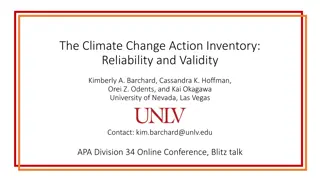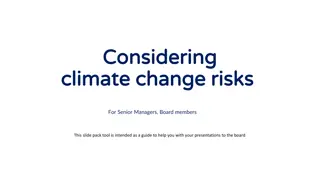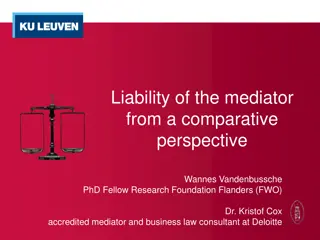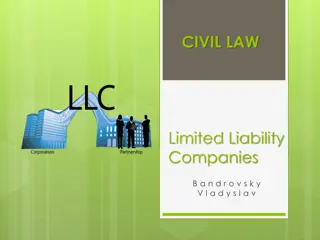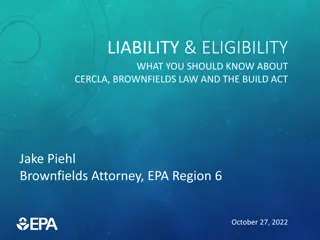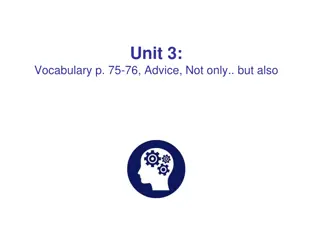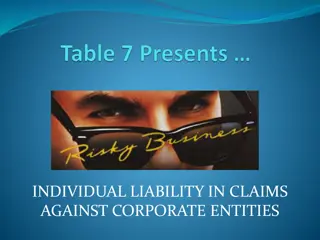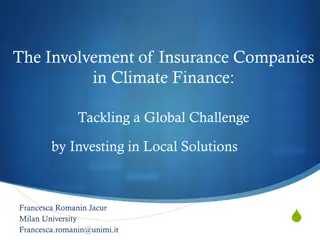Climate Change Liability in London Perspective
The issues of climate change liability from a London viewpoint in 2012, exploring legal rights, obligations, and the intersection with security, food, water, and various economic aspects. Analysis includes the convergence of public and private law concepts towards effective regulation.
Download Presentation

Please find below an Image/Link to download the presentation.
The content on the website is provided AS IS for your information and personal use only. It may not be sold, licensed, or shared on other websites without obtaining consent from the author.If you encounter any issues during the download, it is possible that the publisher has removed the file from their server.
You are allowed to download the files provided on this website for personal or commercial use, subject to the condition that they are used lawfully. All files are the property of their respective owners.
The content on the website is provided AS IS for your information and personal use only. It may not be sold, licensed, or shared on other websites without obtaining consent from the author.
E N D
Presentation Transcript
Climate Change Liability Some issues from a London perspective Richard Lord Q.C. 13 September 2012
Why might this be of interest ? Looking backwards analysis of rights and responsibilities for past actions Looking forward a key driver for future behaviour A part of the matrix of scientific, political, economic and ethical considerations
What do we mean by liability Determination of legal rights and obligations But narrowed to leave out contractual obligations Widened to include soft law No such thing as climate change law
The ultimate cross cutting issue Interlocks with security, food, water, all sorts of CPRs/ESCRs and economic issues Not everything which may affect or be affected by CC Still a broad mix of public/administrative law, private law, constitutional and trust law, criminal law, competition law
Law and Politics Not here looking at liability under UNFCCC. But its provisions very relevant Driven by scientific imperatives But only so far it is what is politically possible and not what is necessary Litigation is a blunt instrument but more effective than a soft one. Convergence of public and private law concepts (CBDR, Inter and intra generational equity, precautionary principle, no harm )
THE RISK QUADRANT Effective Regulation Ineffective Regulation Limited effects of CC Questions of liability - minor importance Questions of liability - moderate importance Significant effects of CC Questions of liability - moderate importance Questions of liability - major importance
Risk quadrant further thoughts (1) Iterative effective regulation is often challenged but should lead to less damage BUT in 2012 past that stage UNFCCC framed round mitigation now more and more focus on adaptation and even compensation within UNFCCC Irony that political question and pre-emption doctrines rolled out in US which has done least to legislate at least at federal level.
Risk quadrant further thoughts (2) Also iterative because CREDIBLE THREAT of liability drives behaviour change Business often has Longer time lines Less clouded vision than Government
INSURANCE PERSEPCTIVE Key roles of insurers - property and liability (Steadfast v AES) so first and third party risks Also significant costs exposure under duty to defend Increase in liability claims for secondary liability claims architects, engineers, public authorities etc.
Insurers not just Business as Usual Significant opportunities for insurers who understand the market Conventional products (CGL/EIL) adapted to Climate Change Risks New products CAT bonds, microinsurance Leaders Swiss Re:, Munich Re: Zurich, Geneva Association etc
Liability (1) - Public Numerous Often unglamorous - though see Platform, People and Planet v HM Treasury (2009) FSM v Prunerov (2010)
Public law (continued) Varied Pendulum swing or type of action (claim by or against industry) swings with regulatory climate Environmentalists shut down coal fired power stations Civil society actions wider than traditional environmentalism
War of attrition ? Business challenges to regulation. See Decision of 26 June by USCA (DC Circuit) Coalition for Responsible Regulation v EPA EPA Rules upheld Decision of 21 August 2012 by USCA (DC circuit) EME Homer v EPA. EPA Rules held to be invalid
Public International Law Largely concerned with Treaty Rights but Question of invocation of no harm principle at a state/state level (FIELD report October 2010) September 2011 Palau called for an ICJ advisory opinion on the obligations and responsibilities of states under international law to avoid transboundary harm caused by greenhouse gas emissions
Liability (2) Private (primary) Holy Grail of environmentalists Claims in negligence and nuisance Interesting and difficult questions of causation, foreseeability, negligence. US claims have actually run into the sands on questions of justiciability and standing AEP, Comer, Kivalina But for other problems see Gerrard (2011) Yale Law Journal 135
Liability (3) Information Disclosure and information and risks (Client Earth invocation of Financial Review Reporting Panel, US S-K 101). Pressures from Regulators Environmentalists/Civil Society Shareholders R2I (Right to Information) Art 10 ECHR Art 19 ICESCR
The wrong information False information advertising regulations False information conspiracy claims as advanced in Kivalina and Comer
Liability (4) Secondary private liability Failure to take account of effects. Primary target public authorities, engineers, builders and professionals Dams Katrina Canal Breaches Litigation (2009) Fire breaks Buildings
Liability (5) -Competition and anti-trust Still in infancy But possible rise of liability in relation to unfair competition by high carbon economies externalising cost
Liability (6) Public Trust An ancient doctrine Reinvigorated with US Youth Filings May 2011 But no success yet eg Montana Supreme Court decision refuses to declare the atmosphere to be subject to a public trust (June 2011)
Liability (7) Soft law Key driver Who cares wins OECD Equator Principles Explosion of corporate conduct charters Lateral thinking problems in Uganda, solutions in New York
Liability (8) Rights based Constitutional New constitutions have express environmental rights Kenya, Ecuador (plus standing for Pacha Mama ) Human Rights Ubi ius..... BUT is this true ??? Climate change is a Human Rights issue but will this translate into remedies ?
Other possible trends Convergence of private and public law standards Incremental status of Human Rights standards such as Ruggie principles from guidelines to de facto benchmarks of reasonable conduct
Developing country muscularity Frustration Developing countries impacted, developed countries emissions But lines blurred many are both emitters and victims India, China, etc. etc. Judicial activism in India, Philippines etc (1993 Oposa v Factoran Rights of future generations)
And more teeth ? More damages ? Enforcement abroad ? Assets at home ? Chevron v Ecuador the shape of things to come ?
